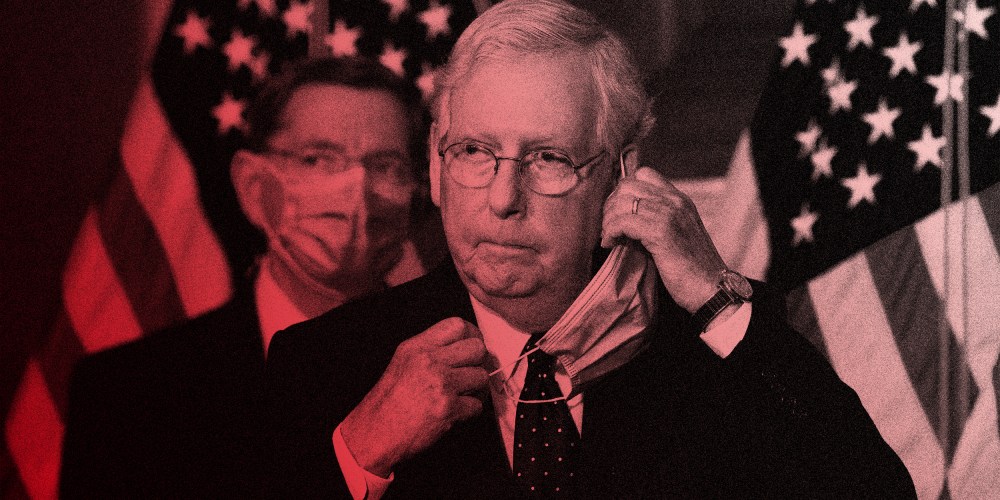He used to brag about being nicknamed the “grim reaper.” The proud killer of left-wing legislation. “The guy who is going to make sure that socialism doesn’t land on the president’s desk.”
It’s time to consider that there is, in fact, a politician willing to inflict more pain and suffering on Americans than President Donald Trump. And his name is Addison Mitchell McConnell Jr.
The Senate Majority Leader continues to sit on his hands as more Americans die on a daily basis from Covid-19 than died in the Twin Towers.
Today, McConnell is the grim reaper in a much more literal sense. As Sen. Ron Wyden, D-Ore., summed it up: “Congress knows how to help workers and families. It knows how to prevent the looming recession,” he tweeted in the wake of yet another awful set of unemployment numbers. “One person is standing in the way. Mitch McConnell’s political games are costing lives and livelihoods.”
Congress knows how to help workers and families. It knows how to prevent the looming recession. One person is standing in the way. Mitch McConnell’s political games are costing lives and livelihoods.
— Ron Wyden (@RonWyden) December 4, 2020
This is not mere partisan hyperbole. The Senate majority leader continues to sit on his hands as more Americans die on a daily basis from Covid-19 than those who died in the terror attacks on the twin towers of the World Trade Center; as 1 in 8 Americans go hungry; as millions of Americans enter permanent unemployment.
What does McConnell offer them? A “skinny” stimulus bill, consisting of a mere $500 billion in aid, when the near-consensus view among top economists is that it needs to be at least $2 trillion. Skinny? Try “emaciated,” as Sen. Chuck Schumer, D-N.Y., put it in September. In October, when the Trump administration tried to reach a $1.8 trillion compromise with congressional Democrats, it was McConnell who shot it down.

But he was unshaken; $500 billion, he intoned. Not a penny more.
McConnell’s refusal to authorize further government spending in the midst of this crisis has had — and will continue to have — deadly consequences. We learned this the hard way after the 2008 financial crash.
A 2017 study in the British Medical Journal found that the “squeeze on public finances” in the wake of the crash was “linked to nearly 120,000 excess deaths in England.” A 2014 study in the British Journal of Psychiatry found the Great Recession led to more than 10,000 added suicides in Europe and North America. “Fiscal policy, it turns out, can be a matter of life or death,” wrote sociologist David Stuckler and epidemiologist Sanjay Basu, co-authors of the book, “The Body Economic: Why Austerity Kills,” in 2013. “What we have found is that austerity — severe, immediate, indiscriminate cuts to social and health spending — is not only self-defeating, but fatal.”
The United States is confronting not just the worst economic crisis since the Great Depression but the worst health crisis since the Spanish Flu.
Today, state and local governments are on their knees and begging for federal aid. So, too, are health care workers, as hospitals hit breaking point. Come the end of this month, as various provisions of the Coronavirus Aid, Relief, and Economic Security (CARES) Act expire, millions of gig workers, freelancers, and long-term unemployed will lose their unemployment benefits; millions of renters will lose their homes as the nationwide eviction moratorium ends; tens of millions of borrowers will have to restart their student loan payments.
“All of this beyond outrageous. It should infuriate us all. We often say the United States is the richest country in the history of the world. Well what is the point…if you then say you cant afford to feed…house…employ your population?”
— Mehdi Hasan (@mehdirhasan) December 3, 2020
I got angry on the @mehdihasanshow: pic.twitter.com/Mh0ykIQIAi
So will these looming deadlines force the obstinate Senate majority leader to reluctantly sign off on a new bipartisan bill that offers $908 billion in relief? That’s half of what Trump says he was willing to agree to in October, and less than a third of what House Democrats initially asked for in the Health and Economic Recovery Omnibus Emergency Solutions Act in May.
Remember: The United States is confronting not just the worst economic crisis since the Great Depression but also the worst health crisis since the Spanish flu. The Centers for Disease Control and Prevention Director Dr. Robert Redfield says the coming winter is “going to be the most difficult time in the public health history of this nation.” Epidemiologist Michael Osterholm, a Covid-19 advisor to President-elect Joe Biden, is even blunter: “We are about to enter Covid hell.”














